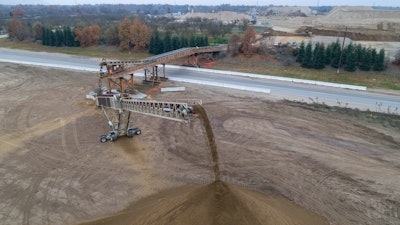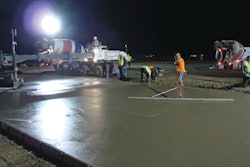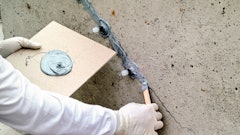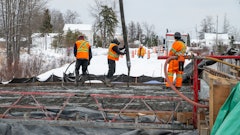
Caltrans recently combined the fortune of a close material yard with engineering ingenuity, installing a material conveyor bridge over State Route 80 in Fresno County.
The project involves converting an existing 2-lane rural state highway to a 4-lane expressway. Once complete, the new route will improve traffic flow on State Route 180 in rural Fresno County by extending the current four-lane expressway 4.5 miles east to the base of the Sierra foothills. Work on the third and final segment of the Kings Canyon Expressway Project began in July of 2017.
That type of expansion requires the movement of a lot of material to construct new lanes on mostly new alignment. So the engineers came up with a plan to move the materials over the roadway instead of on it.
“We are very excited about the conveyor system,” Malcolm Dougherty, Caltrans director says. “It shows how Caltrans is always looking for innovative ways to do things. And if it’s going to save money and improve safety, it’s a win-win situation for the state and the motoring public.”
Lucky Location
With a massive project like this one, the logistics of moving materials can always be a struggle. For the construction of two new lanes, approximately 464,000 cubic yards of fill material was needed, along with aggregate for base material, concrete for the highway lanes and bridges and asphalt concrete for the local roads.
The unique idea of moving dirt and aggregates over the roadway on a conveyor bridge was presented to Caltrans by a subcontractor who worked at the nearby Vulcan Materials Yard.
“Coincidentally the subcontractor who is supplying fill and aggregate material to the project has his material plant adjacent to the project site,” Neil Bretz, project manager with Caltrans says.
"The overall design was approved by the state prior to erection and was basically constructed the same way the contractor would erect temporary falsework for bridge construction,” Neal Bretz, project manager with Caltrans says. “There are two temporary wooden towers, one on each side of the highway protected by k-rail with steel beams spanning the 2-lane highway. A solid top was placed on top of the beams to support the conveyor system as well as a walkway for maintenance staff. Traffic was temporarily stopped for the placement of the beams.”
The system was installed in approximately 3 weeks and will operate for six to eight months. The bridge over the highway is approximately 40 feet, the total conveyor system is approximately 700 feet long. Over the course of the project, the conveyor system will transport 800,000 tons of material, helping to relieve congestion, mitigate road degradation and reduce emissions by eliminating 135,000 truck miles.
“Once the material is transferred over the roadway, we’ll pick it up with conventional earthmoving equipment,” Mike Sheffield, Security Paving Company senior engineer says. “We’ll be able to transport the material from there within the new project alignment and minimize our impact on the traveling public.”
Not only is the bridge improving logistics, it’s also improving safety on along the project route.
“It’s a big safety win for us,” Bretz says. “We’re removing hundreds of trucks from the roadway each day for weeks at a time.”
Once the project is complete, the conveyor bridge will have moved approximately 800,000 tons of material. Over the course of the project, that will equate to keeping 35,000 truckloads of material off the highway during construction.
“It’s great when a team can come together on an idea that will benefit all parties involved, including the public,” Sheffield says. “It definitely speaks to the partnership Caltrans has with its contractors.”
The project is scheduled for completion in October of 2020 and Bretz says the contractor may also use the system to move additional aggregate for concrete paving.



















